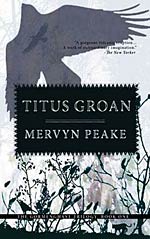
![]() Scott Laz
Scott Laz
1/3/2012
![]()
In Titus Groan, Mervyn Peake created a masterwork of alternate reality, unlike anything else in literature. For good reason, David Pringle begins the date range for his Modern Fantasy: The Hundred Best Novels in 1946, so that this can be the first entry on his list. It achieves its unique vision with a combination of vivid setting and characterization, both built up with a luxurious edifice of language that is a joy to read.
Titus Groan is the first novel of Peake’s Gormenghast sequence, of which three novels were published during his lifetime, with other planned volumes never completed. His widow’s completion of the fourth novel, Titus Awakes, was published in 2011.
It’s a difficult novel to characterize in terms of genre definition. Though generally categorized as fantasy, it doesn’t fit neatly into the category. It takes place in a fantasy setting, in the sense that it is a place and/or time that is nonexistent, yet nothing literally “fantastic” happens in the novel. There are no explicit magical or supernatural elements in the story. The building up of the sense of place is one of the great enjoyments of the novel, so any summation will fail to do it justice, but the words that come to mind in describing Gormenghast, the castle setting, are “weight” and “tradition.” The characters have Dickensian names like Sepulchrave, Prunesquallor, and Swelter, and there are other echoes of British culture, which the setting may in part be a commentary on. Titus, born at the beginning of the story, is destined to be the 77th Earl of Gormenghast, implying (though it is not made explicit) a 2,000-year dynasty. Throughout this time (at least), the castle and the surrounding lands have observed strict and unchanging rituals, the specifics of which are nonsensical (and are humorous in their description), but which all the characters agree on the importance of. Though such literal speculation is probably pointless, it’s even possible that the setting could be in the far future, after humanity has lost most of its technology and returned to a sort of feudal existence even more rigid than that of the Middle Ages. (It would not surprise me if Peake was an influence on Jack Vance’s Dying Earth.) The world of Gormenghast has the “Dark Ages” feel beloved of fantasy writers, but there are oddities, such as Dr. Prunesquallor’s knowledge of anatomy and chemistry, and the fact that characters drink coffee, that seem anachronistic. Despite the lack of change, there is also a sense of decline. The reasons for the rituals are forgotten; sections of the castle have not been visited for centuries; the hereditary leaders are subject to imbecility and mental illness; only Steerpike, the outsider whose story provides the primary plot of the novel, notices details of his surroundings that the other characters give no thought to.
In this world, change is considered to be the greatest evil. Just as Titus is born to continue carrying on the traditions, Steerpike is introduced as an agent of change. There are several ways to interpret the role of Steerpike in the story. He is born as a kitchen laborer, destined to drudgery in the lowest level of the castle, but is determined to find a way out, slowly insinuating himself into the lives of the high-born characters by finding ways of making himself indispensable to them. Is he a working-class revolutionary looking to bring equality to this society (a view he espouses at times), or rather a sort of infection rising up from the depths of the castle to destroy the lives of the other characters (a reading consistent with his actions)? At times, we sympathize with Steerpike, and admire his intelligence and willingness to act, in strong contrast to the ritual-bound and seemingly lifeless existence of the other characters. On the other hand, we also sympathize with the Earl’s family. They are not evil, and are just as much bound by tradition as the servants, being forced to participate in endless boring rituals, without any other purpose in life. As a result, Lord Sepulchrave (the 76th Earl) retreats into his library and is continually depressed, his wife Gertrude retreats from the society of other people and responds emotionally only to pets, and their teenage daughter Fuchsia wanders mentally and physically in search of some sort of happiness or enervation that seems out of reach. We might approve of a “shaking up” of this world, but Steerpike revels not just in change but in destruction, setting in motion a series of events that eventually erupt into violence, and his motives seem entirely selfish.
It is tempting to see an allegory. Is Gormenghast meant to represent the post-War British society in which Peake lived, its class system resisting the modernity brought on by the rapid historical changes resulting from world war and the decline of Britain’s empire? If so, it could be that Peake was both criticizing this world and regretting its destruction. This ambiguity of reaction to historical change is not atypical, as evidenced by the impulses toward both conservatism and liberalism characteristic of modern societies. An unchanging society is stifling to individuals, but change is painful to those accustomed to (especially if they are invested in) the status quo.
Part of the genius of Titus Groan, however, is that readers with no comprehension of (or interest in) the potential subtext, if they are lovers of good writing, fictional world-building, and vivid characterization, will still see the novel as a classic of fantasy. Peake immerses us in a world that is both alien and familiar. Each sentence adds a brick to the edifice of both Gormenghast and the novel that describes it. The word “classic” may be overused, but I’m using it here!